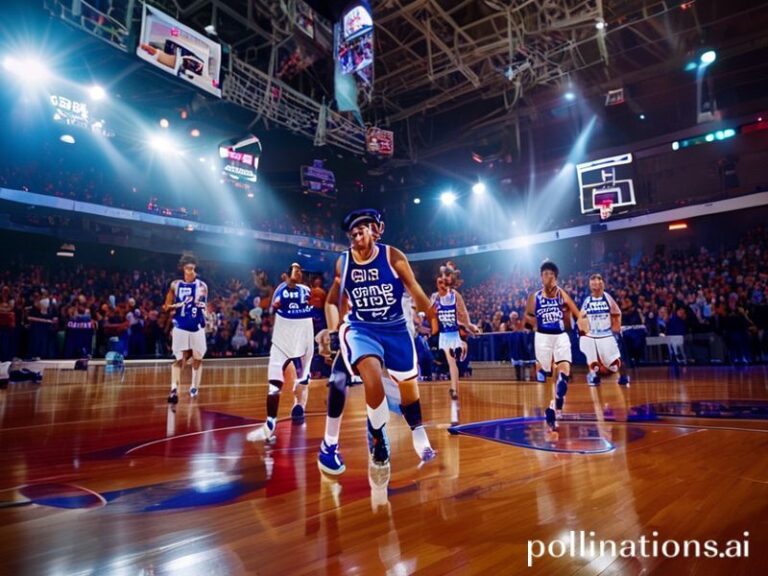Trumpet of Doom: How Edwin Díaz’s Knee Became the World’s Most Watched Ligament
Edwin Díaz and the Trumpet Heard ’Round the World
By our jaded correspondent who still keeps scorecards in three languages
SAN JUAN, PUERTO RICO—When Edwin Díaz tore his patellar tendon last March, the blast of a single trumpet in the World Baseball Classic caused more seismic ripples than most NATO communiqués. One moment the planet’s best closer was shimmying to “Narco,” the next he was sprawled on the infield like a marionette whose strings had been clipped by an invisible bureaucrat. In the grand scheme of things—Ukraine smoldering, glaciers staging their farewell tour—a relief pitcher’s knee shouldn’t matter. Yet within minutes the hashtag #Díaz trended above #Putin and #ClimateApocalypse, proving that humanity will always prioritize the tragedy it can fit into a nine-inning box score.
Internationally, the injury was treated like the devaluation of a minor currency. Markets didn’t tank, but the mood in Taiwan, South Korea, and Japan—countries that manufacture half the planet’s baseball dreams—sagged. Japanese coaches, who treat every MLB stat like a sacred scroll, winced in unison: another data point confirming that joy is taxable. In South Korea, KBO general managers quietly moved “dancing closer” lower on their scouting rubrics, right between “charisma” and “probable enlistment date.” Meanwhile, European sports editors filed 400-word explainers titled “What Is a Closer?” next to their evergreen pieces “Is Baseball Just Rounders on Steroids?”
The Mets, that global hedge fund with batting helmets, instantly became a case study in risk diversification. Steve Cohen—billionaire, art collector, and man who could buy Greece but prefers misery—saw $102 million in guaranteed money limping toward an MRI tube. Across the Atlantic, Premier League chairmen smirked: “Only a hundred million? We call that a relegation bonus.” The injury validated soccer’s conservative approach to celebrations; no one at Arsenal is tearing an ACL while doing the Macarena.
In Latin America, the reaction was more existential. Puerto Rico, already a colony of contradictions, lost its unofficial minister of morale. When Díaz pitches, the island’s blackout schedule briefly pauses—bars power up, generators cough alive, and for three outs Puerto Ricans remember what reliable electricity feels like. Without him, the diaspora in Orlando and the Bronx had to settle for reggaeton and cheaper rum. Venezuelan players, watching from winter-league dugouts, offered the kind of solidarity only possible between nations bonded by defaulted bonds: “Could be worse, hermano. You could be paid in bolívars.”
The broader significance? Modern civilization has perfected the art of exporting disaster, but a ligament still snaps the old-fashioned way—locally, audibly, in front of 35,000 witnesses and seventeen slo-mo cameras. Díaz’s knee became a Rorschach test: Americans saw a fantasy-league catastrophe; Europeans saw another overpaid entertainer; Cubans saw a reminder that even defectors can’t defect from biology. Somewhere in Geneva, a WHO bureaucrat scribbled “knee = metaphor” on a Post-it, then went back to drafting resolutions no one will read.
Rehab, of course, is universal. Díaz spent the summer in Port St. Lucie doing plyometrics while the planet burned—literally, as Canadian forests staged their own home-run derby of ash. Each leg press was live-streamed to insomniacs who prefer hope with a side of electromyography. By September, when he finally started throwing off a mound, the footage looked like a UN goodwill clip: a man in fluorescent sneakers reenacting Sisyphus, but with a radar gun.
Now, as the new season looms, bookmakers from Macau to Malta list the Mets at 22-1 to win the World Series—odds suspiciously identical to the chance that humanity keeps warming below 1.5 °C. Both bets hinge on fragile joints: Earth’s tectonic plates and Díaz’s right knee. Which gives first is anybody’s wager, but at least Edwin has a trumpet waiting, ready to announce either salvation or another comic twist in the endless extra innings we call progress. Until then, the planet spins, badly bullpen-managed, one out away from either celebration or catastrophe. Probably both.







